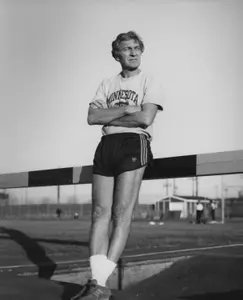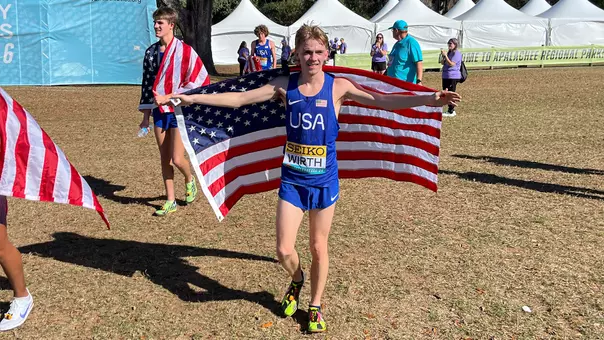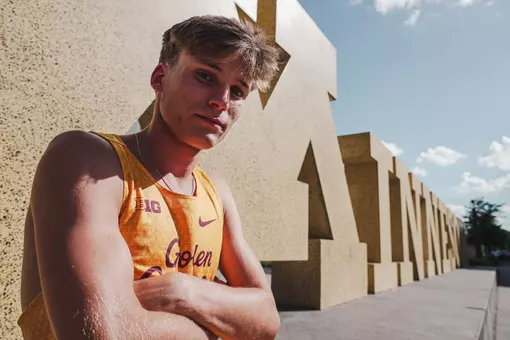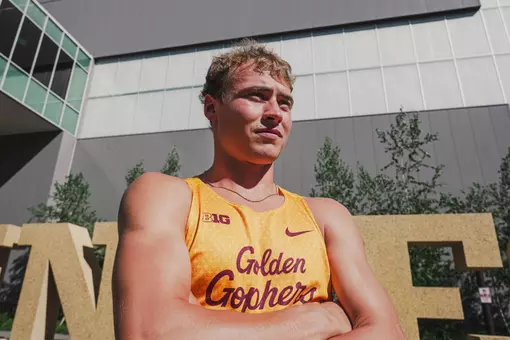University of Minnesota Athletics

Griak Hall of Fame Feature: Roy Griak
9/17/2015 12:00:00 AM | Men's Cross Country
The University of Minnesota will celebrate the 30th annual Roy Griak Invitational as part of Homecoming festivities on Saturday, Sept. 26 at Les Bolstad Golf Course in Falcon Heights, Minn.
As part of the celebration, Gopher Athletics has announced the formation of the Roy Griak Invitational Hall of Fame with eight inductees slated to be honored in the inaugural class. As the Griak Invitational approaches, GopherSports.com will highlight each of the honorees including today's feature on Gophers coaching legend Roy Griak.
Roy Griak's impact on running will probably never be fully understood. His impact on the lives of countless individuals, even more impressive, never fully explained.
Griak, the longtime coach at the University of Minnesota, died on July 9, 2015 at his home in Plymouth, Minn. He was 91.
Griak's death ended a service of more than 50 years to the University of Minnesota. But, his influence is sure to be felt for decades to come.
Griak graduated from Morgan Park High School in Duluth, Minn. in 1942. After serving in the U.S. Army Infantry in the South Pacific (1944-46) Griak returned to his home state, a place he referred to as "paradise," and enrolled at Minnesota. He competed in cross country and track for coach Jim Kelly and began to build his reputation at the school and a legacy that would stretch to all corners of the world.
Griak graduated from Minnesota in 1949 with a degree in education and added a master's degree from the school the following year. He began his teaching and coaching career in 1950 at Nicollet High School and later worked for the Mankato Public Schools and St. Louis Park High School.
At St. Louis Park, where he worked for 11 years (1952-63), Griak led his cross country teams to a pair of state titles (1955, 1961) and his track teams were crowned state champions on three occasions with the first championship coming in 1958 before claiming back-to-back titles in 1962-63.
Just weeks after winning his third state championship in track, Griak became the head coach at Minnesota replacing his former mentor when Kelly retired from leading the Gophers.
Griak remained coach of the Gophers for 33 years until his retirement following the 1996 track season. His cross country teams won a pair of Big Ten championships. The first title, in 1964, came in Champaign, Ill., in just his second season as coach as the Gophers scored 27 points to outdistance runner-up Michigan State, which tallied 49 points on the day. It was the first conference cross country title for Minnesota since the Gophers claimed the 1909 Western Conference championship under the leadership of Dick Grant.
The second title with Griak at the helm came five years later as Garry Bjorklund won the individual title to help as Minnesota scored 40 points on the day in Bloomington, Ind. to win the 1969 conference championship. Illinois placed second with 73 points.
For Bjorklund, it was the first of his three individual conference championships and his affection for Griak was evident when asked about the death of his former mentor.
"Do you have a few hours," Bjorklund inquired when asked about the impact Griak had on his life.
"It's a hard time for all of us who knew and loved Roy Griak," said Bjorklund, who went on to his own coaching career. "As tough as the passing of (Griak) is, we all know it was time to pass the torch to someone else to try to make the contributions to cross country and track that Roy Griak did."
"Good luck with that," the Gopher great said.
Bjorklund, who attended high school in Proctor, Minn, not far from Griak's stomping grounds in Duluth, told the story of letters he received weekly from Griak during the recruiting process prior to officially signing to compete at Minnesota.
"He always told me in the letters that he hoped I would enroll and compete at Minnesota," Bjorklund recalled, "and he made it point to tell me that my "friend" at Minnesota was doing well. That so-called "friend," someone new each week, was always someone who kicked my butt in high school that (Griak) had recruited."
"But, the bottom line is that Roy Griak's fingerprints are everywhere," Bjorklund added. "He was a remarkable teacher and a remarkable coach. He never treated any athlete better than anyone else on the team. He told us all we could either train like a champion or a manure pile ... and he was great at getting his point across to an athlete in one simple sentence."
Bjorklund, who would later go on to win an NCAA championship in the 10,000 meters in track under Griak's tutelage, said one of the key components to Griak's success as a coach was his approach to the athletes he mentored for more than three decades as coach at the school and the way in which he approached the craft he perfected like few other coaches, in any sport, ever have.
"He had this great ability of laughing while dressing you down when you didn't do the things you were expected to do," Bjorklund said, "and he was a master at making you realize the importance of learning from the guys who came before you."
Bjorklund, the first Big Ten runner to claim three conference cross country championships since Minnesota's F. O. Watson ran his way to three-straight titles (1913-15), said he remembers the times Griak would send his athletes to the library to study on microfiche the achievements of the people who had already achieved greatness while wearing the Maroon & Gold of the Gophers.
"He always stressed that the greatness of the individual and a team could never be appreciated until we understood the greatness of the athletes who came before us," said Bjorklund who would go on to represent the United States at the 1976 Olympic Games in Montreal.
Watson and Bjorklund would remain the only Big Ten runners to claim three individual conference championships until Illinois' Craig Virgin would win four straight (1973-76). Indiana's Bob Kennedy (1988-90, 1992) and Michigan's Kevin Sullivan (1993-95, 1997) would later join Virgin as four-time conference champions, while Wisconsin's Simon Bairu (2003-05) has also won three individual conference titles
Bjorklund also recalled the compassion for others that became a trademark of the iconic Gopher coach.
During Bjorklund's career, a runner for an opposing Big Ten team had not performed up to the standards of his own coach and was left to find his own way home from a cross country meet.
Griak would not allow that to happen. He invited the runner to have dinner with the Gophers and Griak made certain the athlete was able to return to his home campus.
His 1968 squad finished second at the conference meet and placed fourth at the NCAA championship meet ~ the highest NCAA finish in Minnesota history.
His track team's best finish at the conference meet came in 1968 when the Gophers finished atop the award stand for the first time since 1949 as Minnesota won just its second outdoor track championship. The school added two more titles (2009-10) with Griak playing a key role as the administrative assistant. As head coach at Minnesota Griak coached a total of 47 All-Americans and 60 Big Ten champions, including Bjorklund's three conference crowns in cross country.
"When I think back to my greatest memories as a runner, it is not the conference titles as an individual," Bjorklund said, "nor is it the being an All-American or an Olympian ... my greatest achievement is I was a part of a team coached by Roy Griak."
"Roy Griak was an icon in the running community and a legend among the Gopher family," said Steve Plasencia, the current director of men's track and field and cross country at Minnesota. "His devotion to the University of Minnesota touched immeasurable lives, and he will be sorely missed by each and every one of them."
Even a week after Griak's death the emotion was still evident in Plasencia's voice as it cracked when talking about the Minnesota icon.
"My time as an athlete with (Griak) as coach was really a special time" Plasencia said.
Plasencia took over for Griak when the iconic coach retired in 1996. But, even in retirement nearly two decades ago Griak retained a prominent role with the program he redefined during his career as head coach.
From 1996 until earlier this year, Griak worked as the administrative assistant and maintained an office across the hall from Plasencia in the Bierman Athletic Building on the Minnesota campus.
"I envy (Plasencia)," Bjorklund said. "To sit just steps away from (Griak) on a daily basis is something any coach could only dream of."
The importance of the office placement is not lost on the current Gopher coach.
"Having an office across the hall from (Griak) for 18 years is also something special," Plasencia said. "Trying to operate a Division I program is sometimes cutthroat, but having him there with his constant smile and endless words of encouragement was priceless.
"He really cared about the program and the athletes," Plasencia continued, "and he simply connected with everyone he ever came in contact with."
In addition to the three national champions and three conference titles as the head coach, Griak was instrumental as three more Gophers earned NCAA titles with Griak as administrative assistant. In all, Griak coached at least one national champion in five different decades.
Bjorklund (1971), Ron Backes (1986) and Martin Erickson (1993) all earned a title with Griak as head coach, while Vesa Rantanen (1998) and Adam Steele (2003) captured crowns with Griak playing a key role. Luca Wieland won the NCAA decathlon title in 2015 and while Wieland may be the last Gopher to win a national championship under Griak's direct leadership, there may be more as the Gophers retain several athletes who Griak has influenced during their own time in Gold Country.
"I was lucky enough to know (Griak) for most of my life," added Plasencia, who was a cross country All-American while competing for the coaching giant. "I don't think I've ever met someone who was as dedicated or genuine as he was. (Griak) was a great, great man ... he will be missed dearly and remembered fondly."
Gary Wilson spent several years working with Griak after Wilson became the women's cross country coach at Minnesota in 1985. The two developed a mutual respect and admiration and a special kind of bond between two coaching legends.
"He was like a dad to me," said Wilson, who spent 28 seasons guiding the women's cross country program before retiring following the 2012 season. "He was the kind of person you always wanted to be like, but knew you could never come close to matching the qualities he possessed.
"It was such a comfort having him in the building," added Wilson, who spearheaded the drive to rename the school's popular invitational in honor of his friend when Griak retired following the 1996 season. "He was like a life jacket for myself and for so many other coaches."
Griak served on the coaching staff of more than 10 international teams during his career, including the 1972 Olympic Team that competed in Munich, German. He was inducted into the University of Minnesota "M" Club Hall of Fame in 1996 and has also been inducted into the Drake Relays Coaches Hall of Fame (1993) and the U.S. Track and Field and Cross Country Coaches Association Hall of Fame (2001).
The Roy Griak Invitational, one of the nation's most prestigious in-season cross country meets, which will celebrate its 30th anniversary in Sept., will see Griak among the inaugural class of its own hall of fame this fall.
Perhaps the most decorated runner to ever wear the Maroon & Gold for Griak summed it up the best.
"Roy Griak is an ordinary man who did extraordinary things," Bjorklund said.
Story by Ray Maloney
Griak Invitational Historian
| Griak Hall of Fame Features | |||
 |  |  |  |
| Kiel Uhl | |||
 |  |  |  |
| Bill Bergan | |||




